Key takeaways:
- Artist integrity involves remaining true to one’s artistic vision and values, often in the face of commercial pressures.
- Record labels can support artists’ authenticity but may also impose constraints that compromise creative freedom.
- Retaining artist rights is essential for allowing genuine expression and fostering a deep connection with audiences.
- Balancing commercial success with artistic integrity can lead to unique and meaningful music that resonates with listeners.
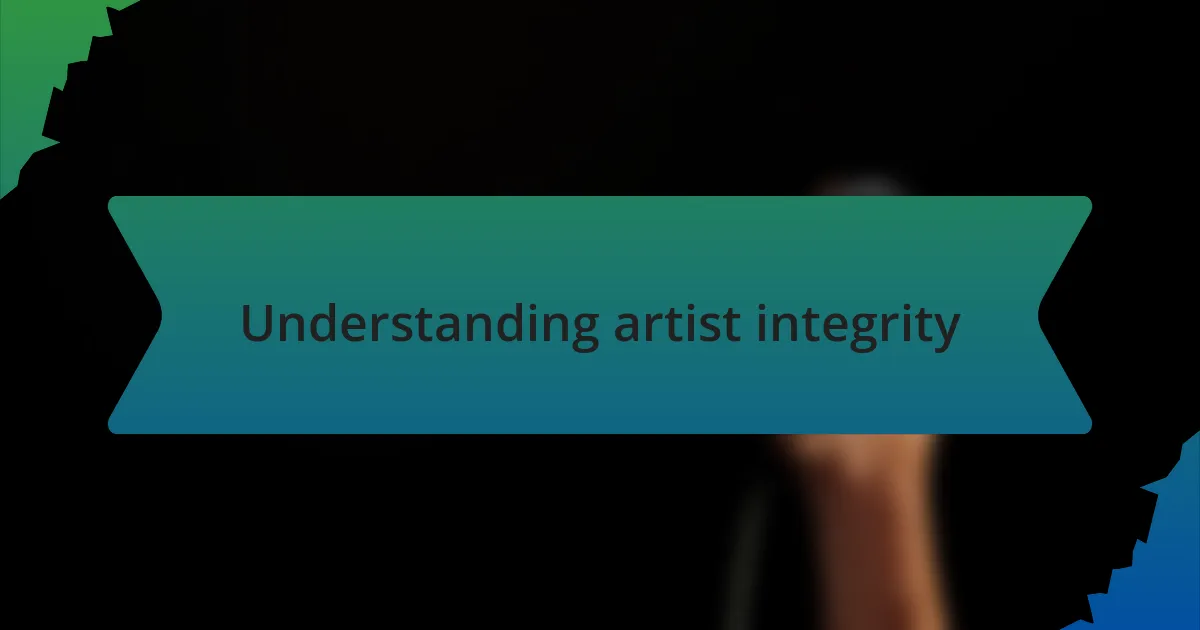
Understanding artist integrity
Artist integrity is about staying true to one’s artistic vision and values, regardless of external pressures. I remember a time when a band I was managing faced the dilemma of changing their sound to fit a trending genre. It was a tough call; they could have gained instant popularity, but ultimately, they chose to stick with their unique style. This experience reinforced my belief that authenticity resonates deeper with fans.
When considering what integrity truly means for artists, I often ask myself: what is more important, fame or authenticity? I vividly recall an instance with a singer-songwriter who, despite significant label pressure, refused to compromise her lyrics for a broader appeal. Her commitment not only preserved her artistic soul but also crafted a loyal fan base that connected with her genuine expression. It’s moments like these that highlight the emotional weight of artistic integrity.
The challenges artists face in maintaining their integrity are real and sometimes daunting. I’ve witnessed firsthand how easily the lure of commercial success can blur an artist’s original intentions. Yet, the artists who embrace honesty and vulnerability often find that this willingness to be themselves fosters a stronger connection with their audience. Isn’t it inspiring how true artistry can flourish in the face of adversity?
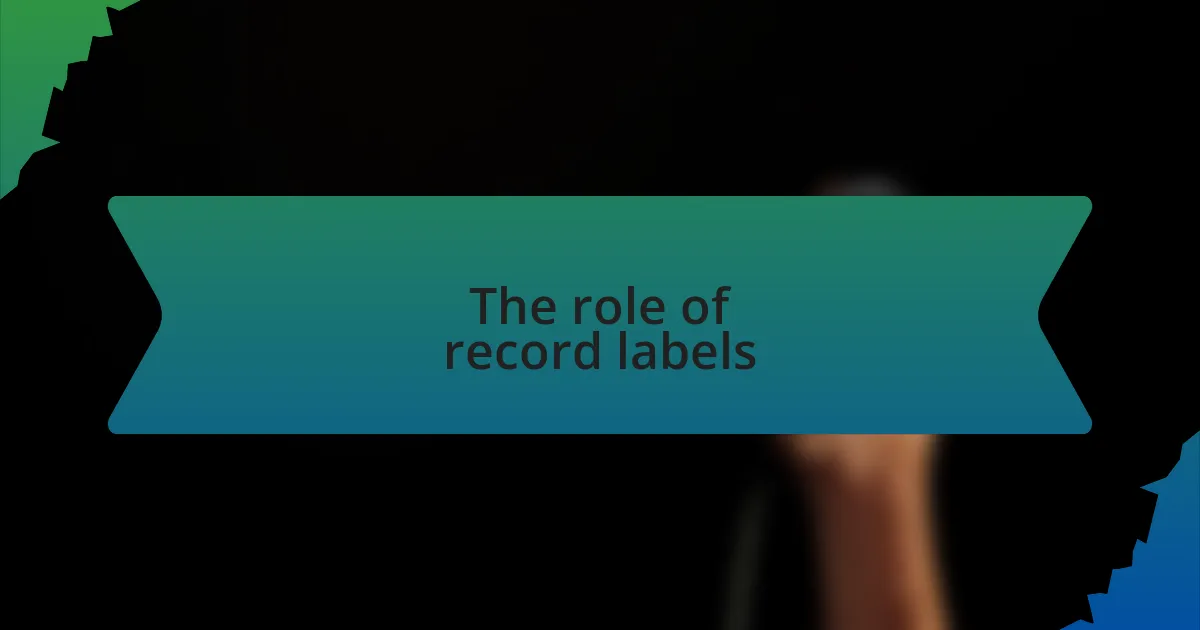
The role of record labels
Record labels play a pivotal role in an artist’s journey, often acting as the bridge between their creative vision and the industry at large. I recall a conversation with an emerging artist who felt overwhelmed navigating the complexities of marketing and distribution. The label not only provided valuable guidance but also offered resources that enabled her to reach a wider audience without sacrificing her artistic message.
Yet, this partnership can sometimes feel like a double-edged sword. I’ve seen artists who receive substantial investment from labels only to find their autonomy compromised. A talented guitarist I worked with had to wrestle with the label’s desire for radio-friendly tracks, which threatened to dilute his distinctive sound. Such instances raise a crucial question: how can labels support creative freedom while still striving for commercial viability?
At their best, record labels can be champions of an artist’s integrity, helping them navigate the tricky waters of the music industry. I remember when a label encouraged a young band to stay true to their eclectic style, believing that their uniqueness would resonate with listeners. It’s experiences like this that highlight the potential of a harmonious relationship, where both artist and label recognize that authenticity is, ultimately, the key to lasting success.
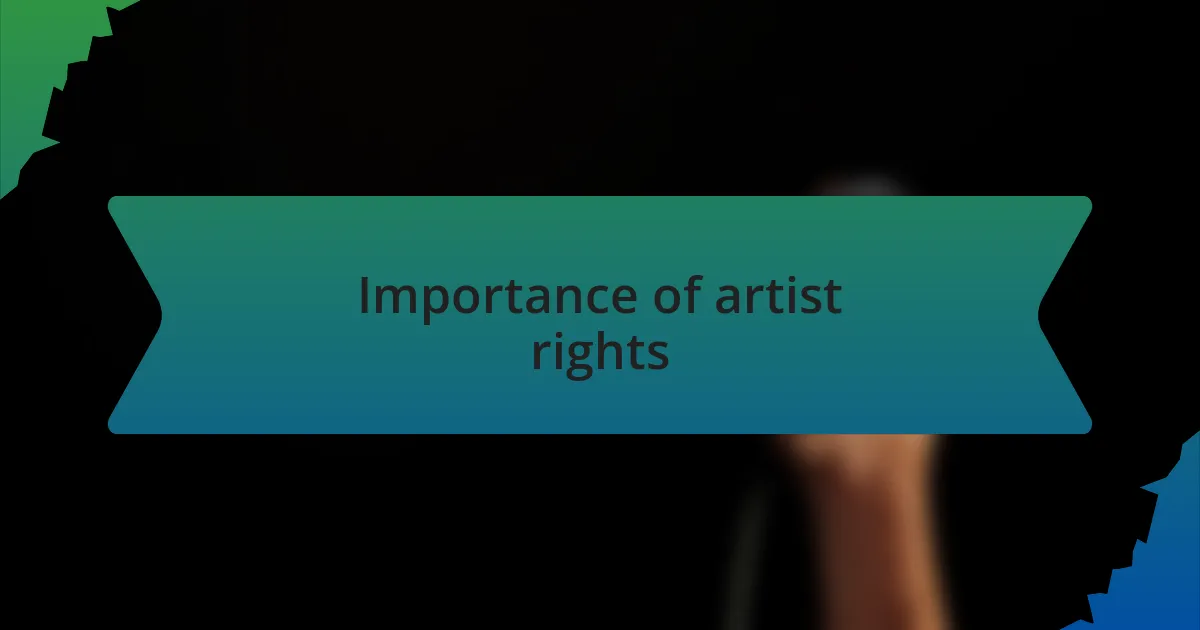
Importance of artist rights
Artist rights are fundamental to preserving the creative spirit within the music industry. I once spoke with a singer-songwriter who faced challenges when her label sought to standardize her lyrics to make them more commercially appealing. In a moment of frustration, she expressed, “I want my songs to come from my heart, not just a formula.” That sentiment resonates deeply; artists should have the freedom to express themselves authentically without being forced into a mold.
When artists retain their rights, it benefits not just them but also their listeners. I remember attending a small gig where the artists played songs that reflected their personal experiences. The raw emotion in those performances was palpable, creating a powerful connection with the audience. Isn’t it crucial for fans to engage with music that feels genuine? When artists control their work, they can share stories that are authentic and meaningful, enriching the cultural landscape.
Moreover, understanding artist rights can empower emerging musicians who may feel voiceless in a competitive industry. I’ve mentored a few independent artists who, upon learning about their rights, decided to negotiate better terms with their labels. The relief in their faces was unmistakable. It’s clear to me that when artists advocate for themselves, they are not just fighting for their own integrity but paving the way for future generations to maintain their creative freedom.
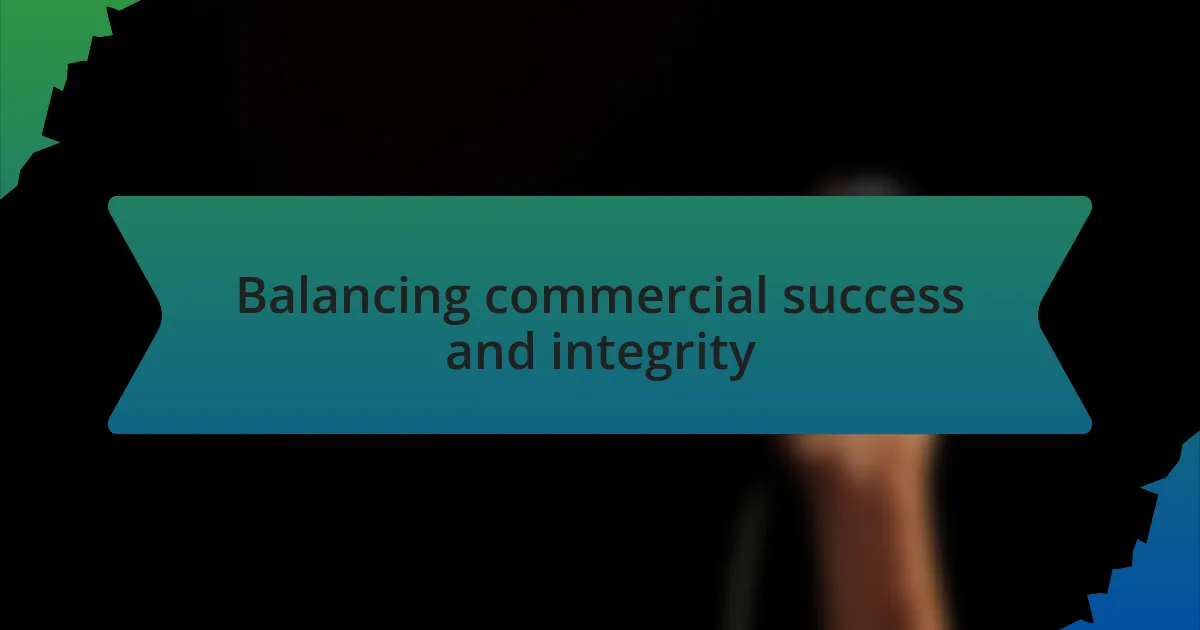
Balancing commercial success and integrity
Striking a balance between commercial success and artistic integrity is a delicate dance. I recall a band I once worked with that faced immense pressure from their label to produce more radio-friendly tracks. They hesitated, torn between achieving higher sales or staying true to their experimental sound. Ultimately, they decided to release their intended album independently. This bold move not only resonated with their core fans but also carved a unique space for them in a crowded market.
Sometimes, I wonder if commercial success comes at too high of a price for artists. I met a talented musician who signed a lucrative deal but quickly felt stifled by the creative limitations imposed by the label. Her frustration was palpable; she told me, “It feels like I’m lost in a corporate machine.” This illustrates a vital point: while commercial appeal can bolster an artist’s visibility, it can also dilute their distinct voice, leading to a loss of authenticity that both artists and fans might regret.
In my experience, the most successful artists are those who manage to harmonize their creative vision with the demands of the market. I once attended a festival where an independent artist blended personal stories with catchy hooks. That mix struck a chord with the audience, reflecting how authenticity can invite commercial success without sacrificing integrity. Isn’t it fascinating how staying true to one’s self can also resonate with larger audiences? I believe that when artists embrace their unique voices, the potential for success, both commercially and creatively, expands significantly.

Personal experiences with artist integrity
When I think about artist integrity, a vivid memory comes to mind from a local gig I attended. The frontman of a lesser-known punk band passionately shared stories of their struggles, making their music feel deeply personal. As I watched the crowd connect with each lyric, I realized how vital it is for artists to share their truth—this connection is their authentic power. Have we ever truly considered how these narratives shape the music we love?
I once collaborated with an emerging pop artist who faced a similar crossroads. Despite an opportunity to work with a big-name producer, she paused out of concern that her original sound could be compromised. Her dedication to maintaining artistic authenticity inspired me; she believed that her emotional honesty was her unique selling point. In the end, she chose instead to record an EP reflecting her raw experiences, proving that staying true to oneself can lead to a more genuine form of success.
Reflecting on these moments, I find myself continually drawn to the idea that integrity is not only about avoiding compromises but also about embracing vulnerability. I remember meeting a seasoned artist at a workshop who spoke about the challenges of remaining authentic in a rapidly changing industry. He shared how every song should feel like an extension of oneself, an honest reflection of one’s journey. Don’t you think that when artists open up, they not only thrive creatively but also create a lasting legacy?

Evaluating integrity in Australian music
In evaluating integrity in Australian music, I often reflect on a folk festival I attended where an indie singer-songwriter bared his soul through his songs. As he strummed his guitar, the rawness of his lyrics resonated with everyone there—each chord felt like a confession. It made me wonder, how often do we encounter such honesty in mainstream music today?
I recall a discussion with a friend who manages a local band. He expressed his frustration with the pressure to conform to trends, sacrificing their genuine sound for mass appeal. This led me to appreciate the courage it takes to stay true to one’s roots, no matter how tempting the lure of commercial success can be. Do fans even realize the sacrifices some artists make to retain their integrity?
When thinking about integrity, I can’t help but consider a conversation I had with a metal artist who defied the genre’s norms. Instead of conforming to aggressive themes, his lyrics encouraged mental health awareness. His decision sparked a discussion on the role artists play in societal healing. Isn’t it fascinating how music can serve as a profound vehicle for change while also reflecting the artist’s genuine self?
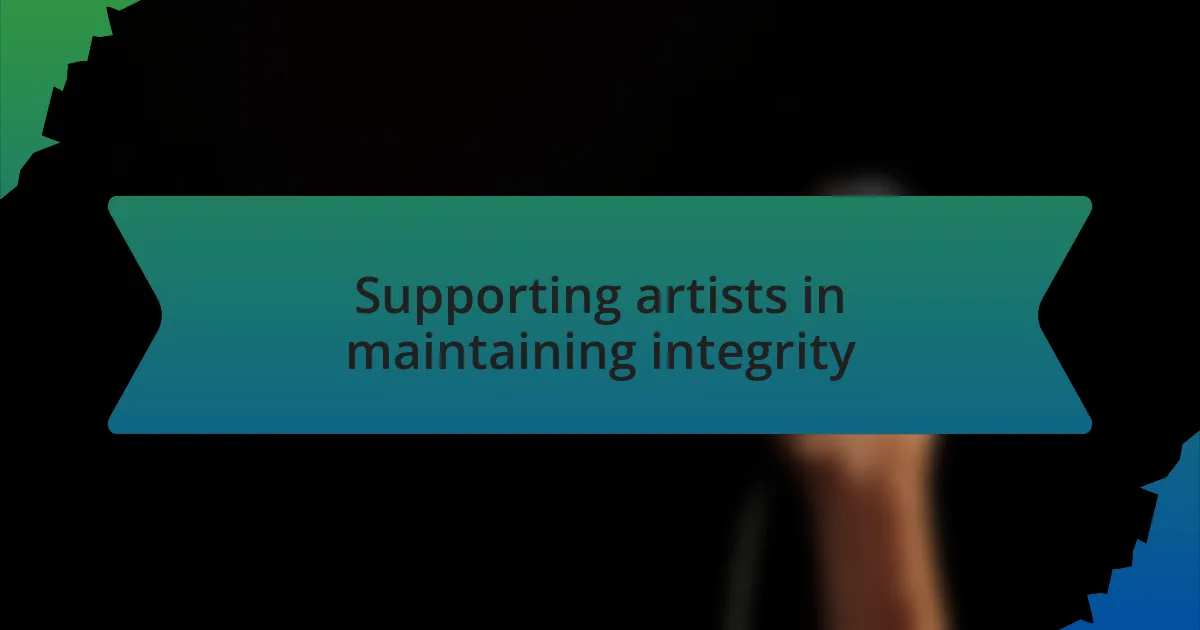
Supporting artists in maintaining integrity
Supporting artists in maintaining integrity is crucial for fostering a vibrant music scene. I remember a conversation with a young singer who was torn between pursuing a deal with a major label and staying independent. She shared how the thought of losing creative control made her chest tighten—it’s a reminder that the pressure to conform can be overwhelming. How many artists have we seen lose their unique voices in the chase for industry validation?
When record labels actively promote independent projects that prioritize authenticity, it allows artists to flourish. I had the privilege to witness a local band thrive after they opted to release an album without corporate influence. Their raw, unfiltered music struck a chord with the community and sparked meaningful conversations about real-life issues. Isn’t it a beautiful thing when artists are empowered to express themselves freely?
Furthermore, providing resources such as workshops focused on songwriting and branding can help artists navigate the complex industry landscape. I once attended a seminar where seasoned musicians shared their experiences on maintaining integrity while achieving success. It opened my eyes to the idea that with the right support and knowledge, artists can find a balance between remaining true to themselves and reaching a wider audience. How often do we encourage this kind of dialogue in the industry?